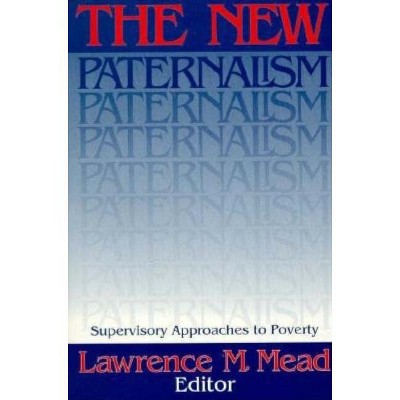Targeting in Social Programs - by Peter H Schuck & Richard J Zeckhauser (Paperback)

About this item
Highlights
- Should chronically disruptive students be allowed to remain in public schools?
- About the Author: Peter H. Schuck is the Simeon E. Baldwin Professor of Law at Yale Law School, where he has held the chair since 1984.
- 184 Pages
- Political Science, Public Policy
Description
About the Book
"Should chronically disruptive students be allowed to remain in public schools? Should nonagenarians receive costly medical care at taxpayer expense? Who should be first in line for kidney transplants--the relatively healthy or the severely ill? In T argetin...
Book Synopsis
Should chronically disruptive students be allowed to remain in public schools? Should nonagenarians receive costly medical care at taxpayer expense? Who should be first in line for kidney transplants--the relatively healthy or the severely ill? In T argeting in Social Programs , Peter H. Schuck and Richard J. Zeckhauser provide a rigorous framework for analyzing these and other difficult choices. Many government policies seek to help unfortunate, often low-income individuals--in other words, ""bad draws."" These efforts are frequently undermined by poor targeting, however. In particular, when two groups of bad draws--""bad bets"" and ""bad apples""--are included in social welfare programs, bad policies are likely to result. Many politicians and policymakers prefer to sweep this problem under the rug. But the costs of this silence are high. Allocating resources to bad bets and bad apples does more than waste money--it also makes it harder to achieve substantive goals, such as the creation of safe and effective schools. And perhaps most important, it erodes support for public programs on which many good bets and good apples rely. By training a spotlight on these issues, Schuck and Zeckhauser take a first step toward much-needed reforms. They dissect the challenges involved in defining bad bets and bad apples and discuss the safeguards that any classification process must provide. They also examine three areas where bad apples and bad bets loom large--public schools, public housing, and medical care--and propose policy changes that could reduce the problems these two groups pose. This provocative book does not offer easy answers, but it raises questions that no one with an interest in policy effectiveness can afford to ignore. By turns incisive and probing, Bad Draws will generate vigorous debate.Review Quotes
" "Targeting in Social Programs" is a valuable contribution to the literature on public policy. Schuck and Zeckhauser do not push for any particular policy; instead they present a detailed approach to improving the efficiency of any social program. This hard-hitting, analytically rigorous book should be welcomed by conservatives and liberals alike. It deserves a wide audience among designers, administrators, and students of public programs."--Victor R.Fuchs, Henry J. Kaiser Jr. Professor Emeritus, Stanford University
"Highly recommended."-- "EconJeff"
"If, perchance, you want to make the American welfare state either more affordable or more politically palatable to a suspicious public, you should read this book, ponder it, and give it to a friend."--Christopher Jencks, "Harvard University"
"Peter Schuck and Richard Zeckhauser have given a solid analytic underpinning to the business of reforming the reforms of earlier eras, in [this] remarkably clear-headed and good-hearted little book."--David Warsh, "Economicprincipals.com"
"Quite compelling."--Frank Pasquale, "Concurring Opinions blog"
"Schuck and Zeckhauser have written a work that is at once lively and entertaining--and analytically rigorous and policy relevant. It deserves a wide and influential readership because the country really would be better off with social programs that made fewer bad bets, and removed more bad apples."--William Kristol, "Weekly Standard"
"Schuck and Zeckhauser provide a timely, sophisticated challenge concerning the effective allocation of resources for social programs."--M. Oromaner, Hudson County Community College, "CHOICE"
"Schuck and Zeckhauser's "Targeting in Social Programs" in clear prose makes the case for predictive targeting as a center piece of welfare legislation."--Ian Ayres, "Yale Law School"
"There's no higher priority in American domestic policy than making our nation's social programs work better. With their focus on targeting, Schuck and Zeckhauser make a creatvie and important contribution to the debate in this vital area. "--Lawrence H. Summers, Harvard University and former secretary of the Treasury
"This is an admirable contribution to the present debate over public choice and social welfare targeting--hard-headed, analytical, clearly written, and accessible."-- "Journal of Regional Science"
"Highly recommended." -- "EconJeff"
"Quite compelling." --Frank Pasquale, "Concurring Opinions blog"
About the Author
Peter H. Schuck is the Simeon E. Baldwin Professor of Law at Yale Law School, where he has held the chair since 1984. His recent books include "Meditations of a Militant Moderate: Cool Views on Hot Topics" (Rowman and Littlefield, 2005).
Richard J. Zeckhauser is the Frank Plumpton Ramsey Professor of Political Economy at the Harvard Kennedy School. He is the coauthor, with Jonathan K. Spence, of "The Patron's Payoff: Conspicuous Commissions in Italian Renaissance Art" (Princeton University Press, 2008).











